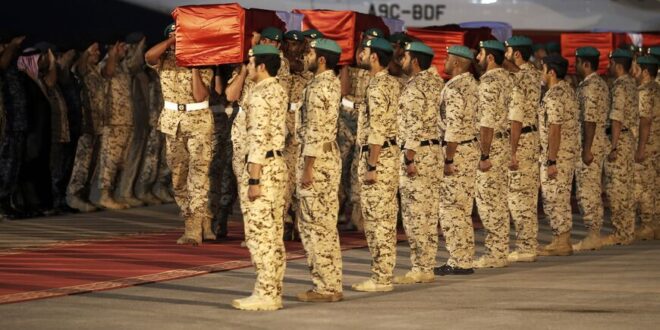An alleged Houthi drone strike that killed three Bahraini soldiers in Saudi Arabia this week has underscored the limits of Washington’s commitment to Gulf states’ defense.
Too close for comfort. Three Bahraini soldiers were killed and a number of others wounded in what Manama said was a Houthi drone attack near Saudi Arabia’s border with Yemen on Monday.
It’s the first lethal cross-border strike publicly attributed to the Yemeni rebels in many months, threatening to disrupt a nationwide cease-fire that has largely held for more than a year despite having formally expired in October 2022.
It’s also the first time Bahrain has lost forces to the Iran-backed Houthis since the 2015 Houthi missile strike in Marib. It’s too soon to say whether the incident marks the start of a trend, but officials in Washington say they are concerned about the potential for escalation.
Less than a week after a Houthi delegation returned from talks in Riyadh aimed at ending the war, the triumphant Iran-backed rebels openly paraded their military hardware — including a F-5 Tiger fighter jet and ballistic missiles — in Sanaa on Monday to celebrate the ninth anniversary of their takeover in the capital.
Just in: Pentagon “strongly condemns” yesterday’s drone attack on Saudi-Yemen border that killed 2 Bahraini military personnel, wounded several others.
Bahrain attributed the attack to Yemen’s Houthi rebels.
— Jared Szuba (@JM_Szuba) September 27, 2023While Saudi Arabia and Bahrain have kept many details of the strike under wraps, the Houthis’ message seems clear enough. But could it derail peace talks?
“Unlikely, though it may be the intention,” tweeted Elisabeth Kendall, a senior research fellow in Arabic and Islamic studies at Pembroke College at Oxford University and a leading expert on Yemen’s conflict.
“After all, several actors in the war contain spoilers keen to help prolong a Saudi-Houthi dimension to the conflict,” Kendall wrote.
A US military official familiar with the dynamic agreed. “There are plenty of incidents that don’t go reported,” the official told me on condition of anonymity.
Still, killing Bahraini soldiers on Saudi territory is a significant development.
The attack may well be seen in Gulf capitals as a test for the Biden administration’s commitment to their security against Iran and its proxies, coming as it did just weeks after Washington signed a new defense agreement with Bahrain that American officials hope to potentially extend to other Gulf countries as well.
That deal stipulates US and Bahraini officials will “immediately meet at the most senior levels” to “develop and implement appropriate defense and deterrent responses” in case of “any external aggression” threatening either country’s sovereignty.
The Houthi drone reportedly landed in Saudi Arabia, meaning it likely falls outside the jurisdiction of the Washington-Manama agreement.
Defense Secretary Lloyd Austin called Bahrain’s Crown Prince and Prime Minister Salman bin Hamad Al Khalifa on Thursday to offer condolences for the loss of his soldiers nonetheless.
Beyond the call, the US military had not taken any action — even deterrent in nature — in response to the attack, Pentagon deputy press secretary Sabrina Singh told reporters in response to a question posed by Al-Monitor on Thursday.
A US military official concurred, saying that it is “outside of the president’s guidance” for the military to directly intervene between the Saudi-led coalition and the Houthis.
A spokesperson for the US military’s Middle East headquarters, US Central Command, offered a markedly different response: “As part of CENTCOM’s theater strategy to counter Violent Extremist Organizations (VEOs), US forces in the region are committed to detecting, degrading and disrupting all organizations hostile to the US and our partners,” a CENTCOM spokesperson told me via email.
“CENTCOM does not release specific details on on-going counter-terrorist operations in the region,” the spokesperson wrote.
Some strategic ambiguity may be of value to the United States here, but Gulf states are looking for tangible signs of commitment. It remains to be seen whether the attack may drive Manama into closer military coordination with Saudi Arabia and other Gulf Cooperation Council states — and how it may impact ongoing US-Saudi Arabia talks over a defense agreement.
For now, it seems, Riyadh continues to demand nothing less than an Article 5-style mutual security guarantee from Washington — however remote the chance of congressional approval — in exchange for normalization with Israel.
“All sides have hammered out, I think, a basic framework for what we might be able to drive at,” White House National Security Council coordinator John Kirby told reporters Friday.
“We’re still being a little careful about talking publicly about what the framework is going to look like and what every party is going to be expected to do,” Kirby said.
 Eurasia Press & News
Eurasia Press & News




